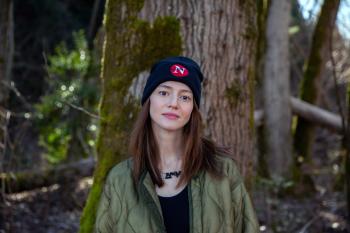Image Caption
Summary
Local Journalism Initiative Reporter
Windspeaker.com
Michelle Cyca is looking forward to introducing “difficult conversations” into the sessions she’ll moderate with Indigenous writers at the Vancouver Writers Fest, which runs from Oct. 16 to Oct. 23.
Cyca, a member of the Muskeg Lake Cree Nation in Saskatchewan, now calls the unceded territories of the Musqueam, Squamish and Tsleil-Waututh Nations home.
This will be her first time moderating at the annual festival and it was an opportunity she jumped at when artistic director Leslie Hurtig approached her a few months back.
“I'm not an author myself, but I love to think about and write about what Indigenous authors are creating these days,” said Cyca.
Cyca is an editor of The Narwhal, an environmental, natural world-focused news provider. She is helping the publication to expand its coverage of Indigenous-led conservation.
She is particularly interested in “digging into it” at the Writers’ Fest with Rueben George, whose book It Stops Here: Standing Up for Our Lands, Our Waters and Our People examines the widespread opposition to the Trans Mountain pipeline. George, of the Tsleil-Waututh Nation, has been one of the prominent leaders in that opposition.
Cyca believes her one-on-one will go beyond George’s personal story and the story of Tsleil-Waututh Nation.
She contends that many of the people who will attend the session, and the festival generally, are concerned about the Trans Mountain pipeline and its potential impact on the lands and water. Cyca thinks that over the years, “settlers in particular” have come to understand how important Indigenous sovereignty and stewardship is for protecting the land and water for everybody.
“I think that conversation is really an opportunity…for our audiences to think, ‘What is their role? What are their responsibilities? How can they stand in this fight? How can they make sense of it?’ I think that's something that a lot of people are thinking about and maybe it’s something that's reflecting their concerns and their concerns for the future,” said Cyca.
In her other session, entitled “The strength of storytelling,” Cyca will talk with Indigenous women writers Michelle Porter (A Grandmother Begins the Story), katherena vermette (The Circle), and Alicia Elliott (And Then She Fell Down).
“I think all of their books deal with how trauma can ripple across generations but leaving a lot of space for empathy and love and forgiveness and transformation. They're really, really powerful and really beautifully written books,” she said.
Cyca is looking forward to hearing what they have to say to each other.
“I think what I'm hoping to explore in that session, and what I think audiences should be expecting, is a conversation about what it means to tell these stories from an Indigenous perspective and explore these kinds of matriarchal connections, these intergenerational connections,” said Cyca.
Molly Cross-Blanchard, a Métis writer, will moderate two panels as well. She will lead two Indigenous writers in discussions in the session “Bestselling teen fiction for a reason.” The Marrow Thieves author Cherie Dimaline will speak on her newest books Funeral Songs for Dying Girls and Into the Bright Open, while Jen Ferguson will talk about Those Pink Mountain Nights. Both authors will participate in other panel discussions.
Cross-Blanchard will also lead three poets, including Métis poet and artist Matthew James Weigel, in “Poets in Conversation.” Weigel’s debut collection Whitemud Walking has won multiple awards.
Cree-Métis writer Carleigh Baker, who is also of Icelandic background, will moderate two panels, including one called “Carving Spaces,” that celebrates the fifth anniversary of the Indigenous Voices Awards. Finalists Nathan Adler, Troy Sebastian and jaye simpson will share readings from their works.
Other Indigenous authors in the festival are Helen Knott, a Dane Zaa, Cree and Métis writer; Coast Salish author and artist Andrea Fritz; and Cree writer Darrel J. McLeod.
Other Indigenous moderators include Plains Cree and Denesųłiné Jarrett Martineau, and Chris Reed of the Beardy’s and Okemasis Cree Nation.
“It's always challenging at festivals to include all the (Indigenous) voices I personally think should be there, but I think it's come a long way,” said Cyca.
She recalls when Sto:Lo author and poet Lee Maracle “kind of stormed” the Vancouver Writers Festival in 1988 and “carved out space for her voice as a Salish woman.”
Maracle had asked to be included in the event but was denied an invitation. She went up on the stage anyway, took the microphone and began reading from her newly published book I am Woman.
Cyca says there’s “an expectation” now at writers festivals across the country for Indigenous voices to be heard.
“There's a degree to which, I think, it comes from a genuine place of wanting to include voices, but I also think that it's a standard that's shifted in recent years,” she said.
Cyca believes that writers festivals see it as an obligation to introduce these difficult conversations that focus on political and urgent issues.
“And…I've been really heartened to see how non-Indigenous readers are willing to pick up these books that are challenging and sometimes painful and sometimes speaking out quite strongly and directly against settler colonialism,” said Cyca.
“I know that's uncomfortable for a lot of readers and so I am glad that these conversations are helping people engage with those topics and maybe move through their own discomfort towards more understanding and more solidarity and allyship.”
The Vancouver Writers Fest will host more than 125 authors in 85 events. The program guide can be viewed here: https://writersfest.bc.ca/wp-content/uploads/2023/09/2023_Program-Guide_web.pdf

